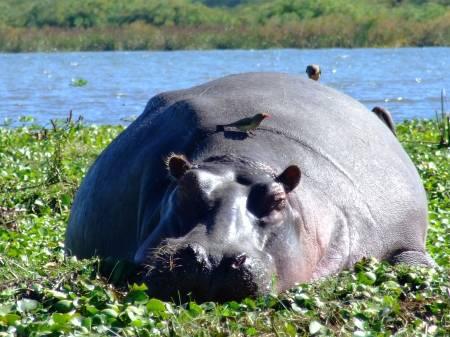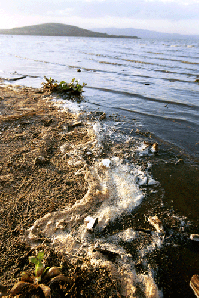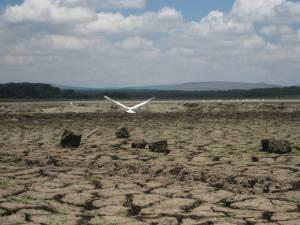[](https://cdn.ecohustler.com/media/2019/03/19/heart.jpg)
What we buy and what we give has far more of an effect then we might think. Whilst all products have an ecological footprint impacting some part of the planet; some have dire, specific consequences for both ecological systems and people. Beef from the Amazon, palm oil products from South East Asia and farmed tropical prawns are well known examples. Less well known is that a massive surge in sales of cheap roses imported from Lake Naivasha in Kenya is 'bleeding that country dry' and drawing hundreds of thousands of people to the dusty edge of a rapidly retreating, once beautiful lake of regional ecological significance.

A Happy Hippo
SUPPORTED BY HEROES LIKE YOU
Support independent eco journalism that drives real change.
An African Eagle
85% of all roses sold in the UK come from Kenya. Lake Naivasha's cut flower industry amounts to nearly 75% of the countries horticultural exports. In 2008, 93,000 tonnes of flowers were exported. About 97% of exports are to the EU. The following year President Mwai Kibaki's government warned that nearly 10 million people, more than a quarter of the population, were at risk from food shortages.
The rapid growth of this industry in a unique and biodiverse ecosystem has had disastrous consequences. The lake's water level has dropped by three metres from its maximum and its surface area has shrunk to half its size. Precious wetlands have been degraded and wildlife no longer comes to drink at the crowded and polluted shores.
The cost for the people is terrible too. The international companies that extract the water (and money) and grow the roses have been repeatedly slammed for failing to protect workers. Hundreds at a time are sacked for trying to protect their rights. Workers are exposed to extremely harsh conditions but so many job seekers come in from the surrounding parched landscape that workers who complain are simply sacked and replaced. Finally the evil was exposed for what it was with the murder of a celebrated (68 year old, female) environmentalist, Joan Root, who tried to make a stand.

A receding and polluted shore of Lake Naivasha
In the mean time, the international companies operating there extract ever more water, diverting it from agricultural production and its ecological purpose of sustaining the land. University of Leicester biologist and Earthwatch scientist Dr David Harper who has conducted research for over 25 years at Lake Naivasha: 'Roses that come cheap are grown by companies that have no concern for the environment, who cut corners and avoid legislation, who sell their flowers into the auction in Amsterdam so that all the buyer knows is the flowers 'come from Holland'. In reality, they have come from Kenya where the industry, is literally, draining that country dry.'
Food & Water Watch, in their report, _Lake Naivasha: Withering under the Assault of International Flower Vendors_, write: 'witnessed chemical spraying while people working nearby wore no protective gear.The pesticides applied on the farms and in the greenhouses eventually end up in Lake Naivasha and in the groundwater, threatening people and wildlife.'

Lake Naivasha Today
This is scorched earth capitalism of the worst kind. These flower companies are making vast amounts of money, the majority of which will not return to Kenya, whist degrading the land. Once the lake is gone they will simply move to similar ecosystems in Ethiopia or elsewhere. They will leave a parched dust bowel reminiscent of the Aral Sea catastrophe, surrounded by dead animals and starving people staggering over the dying land.
The people who defend the import of roses from Kenya do so because they say it provides money and jobs to the local people. Floriculture is estimated to employ over 50,000 directly. However, the benefits are transient and superficial. The flower industry lobbyists are using a timescale so short as to be historically insignificant. At current rates of extraction the lake will be gone in 10 years. What will happen then to the 300,000 people who have been drawn to the shores? When the natural systems that support us goes, everything goes; including the economy. People will die. The economy that should be built around Lake Naivasha is a sustainable local one. By focusing on growing indigenous crops which require low levels of water people can be fed for generations and the lake can remain intact.
The evolution of capitalism has transformed us from beings to consumers. Working for money, and then spending it, is now central to our lives. Our transformation from life form to hungry ghost, mechanized consumers is writ large in the modern manifestation of our festivals. Pre- Christian Christmas celebrated nature by bringing a tree into the home. Then it was a celebration of the birth of Christ. Now it is the biggest consumer event of the year.

Bloody roses
Many corporations now depend on the spending patterns of these festivals to exist. As such, much effort is exerted to compel consumers to conform to the requisite behaviours and spending patterns. This Valentine's Day, as last, millions of brainwashed, randy young (mostly) men will obediently trot to their local supermarket and hand over hard earned cash to get the requisite 12 cheap, imported roses to prove their love to their target mate. Harmless fun you might think. Unfortunately not, as with all mindless consumption there is a cost born by the biosphere and externalized to another part of the world.
'This Valentine's Day, it's important that we finally stop these international operations from depleting the lake's waters, poisoning the surrounding environment with pesticides, and exploiting workers. Unless we end this, these industrial floriculture factories will continue sowing the seeds of poverty, water deprivation, and environmental carnage.'
Maude Barlow, national chairperson of the Council of Canadians
Inhabiting our vast megacities nature is far removed. Yet its resources are needed to supply our voracious, over-stimulated appetites. Our excessive consumption requires that in distant parts of the world forests are felled, lakes are drained and mountaintops removed. We can stroll in comfort on mahogany decking while the mighty forests of the world burn. As mass consumption becomes the norm around the world companies reach further and dig deeper to transform nature into products. The result is that natural systems everywhere are collapsing. Our eyes are blind to the fact that it is our pounds spent, our vote from the wallet that is destroying the natural world.

Skull & Roses
Ten thousand tons of roses bought in Britain for Valentine's Day are imported from Lake Naivasha in Kenya. If your lover gives you roses you have to wonder whether the gift comes bundled with the blood of Africans and the death of an ecosystem.
It is no longer possible for educated people to claim ignorance; despite the media's vested interest in helping to maintain the normal man and woman as obedient consumers. Stories constantly come through to us of extinctions, habitat loss and a dying biosphere. The penny must drop. The lines must connect. The neurones must grow between the synapses. It is us. We are doing this. We are harming the biosphere every time we buy something that is forced from nature. There is only one solution and that is to stop buying unessential consumer products. First stop; do not buy cheap imported roses on Valentine's Day.
Notes
Valentine's Day does not have to be a consumerist nightmare with grave ecological and humanitarian consequences. Here are some sustainable gift alternatives for your lover:
- A delicious seasonal and local meal cooked or bought in your favourite restaurant
- A prolonged erotic massage accompanied by Prince on the stereo
- A poem, song, love letter, painting, photo, mix tape drawn from your creative juices
- A weekend (not too far) away
- Flowers grown sustainably in the UK. Check out Wiggly Wigglers
- Fair trade flowers
Remember, we grow magnificent roses in this country. You just have to wait for the right season. So give your lover some other gift now and this summer you can stick a bunch of roses in her face, fill the bath with petals and generally live the rose scented dream. Just not in February and not with roses flown in from Kenya.
Useful articles: http://www.independent.co.uk/news/world/africa/where-have-all-the-flowers-gone-thorns-among-the-roses-418489.htmlhttp://www.guardian.co.uk/society/2007/feb/14/kenya.conservationhttp://www.guardian.co.uk/uk/2006/feb/13/gifts.kenyahttp://www.edie.net/news/news_story.asp?id=14204http://www.foodandwaterwatch.org/world/publications/reports/lake-naivasha-international-flower-vendors




